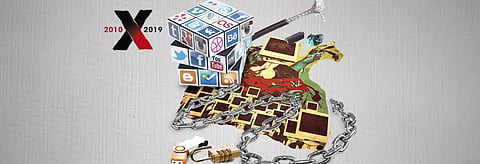

In 2019, we celebrated 50 years of Internet since two computers made node-to-node communication in 1969. As the Internet becomes the public square and the marketplace of our world, it is increasingly becoming a contested terrain. Its potential for diffusing knowledge and subverting the traditional channels of information is tremendous. So it is not surprising that governments, corporations and even seemingly innocuous social networking sites all want to control and influence the way the Internet operates. It’s easy to see why. More than half of humanity is linked to this system—and the dramatic growth in Internet usage over the past decade is set to explode in coming years.
The problem with the use of technology in keeping the Internet safe cuts both ways. With increasing number of cyber attacks on both official and public websites from an array of hackers and malware, governments are reaching for ever more sophisticated high-tech surveillance systems. For instance, computer systems of the US Congress and the executive branches are under attack an average of 1.8 billion times per month. The result: more spyware. One such is deep packet inspection technology. It is a tool that protects customers from rampant spam and virus traffic. Experts say the Internet could not survive without this technology and yet, it helps authorities to keep a close watch on what people are doing on the Net. In the US, ISPs are required to have this technology.
China’s most famous blogger, author of best-sellers and race car driver, Han Han, took a jab at his government in April, 2010 after he was named one of the 100 most influential people by Time magazine (for 2010). In his blog “twocold” he wrote, “Other Chinese nominees include sensitive word, sensitive word and sensitive word.” His post, referring to China’s web censors’ habit of blocking even commonplace names from web searches and blog sites, struck a chord with his readers. Within days, more than 20,000 commented on his post, most echoing Han’s exasperation with the Chinese censorship of the Internet.
China has one of the most advanced web monitoring and blocking systems. The system can be likened to a check at the airport. Every piece of luggage, coming in or going out, is put through a scanner. If any one of them contains weapons or narcotics, the scanner detects it immediately and the articles are impounded. Web filters work in a similar way. They scrutinise and block websites which could range from websites on free speech and democracy to ones on pornography, depending on the country using the system.
The Assange case more than anything else has exposed how vulnerable the Net is to political meddling and control. So while governments in many parts of the world block sites, jail or kill dissidents for expressing their views on the Net, threats to the freedom of the Internet come primarily from the paranoia that governments suffer and from badly crafted policies they implement to protect business and other interests.
The US, the ultimate symbol of liberal democracy, is no less uneasy about the power of the Internet. A slew of laws are making their way through the Senate, laws that will give the administration sweeping powers to seize domain names and shut down websites, even those outside its territory, and laws that strengthen the powers of the president in the time of a cyber emergency, including the use of a kill switch. In September, 2010 the US Senate introduced the Combating Online Infringement and Counterfeits Act, which would allow the government to create a blacklist of websites that are suspected to be infringing IP rights and to pressure or require all ISPs to block access to those sites. In these cases, no due process of law protects people before they are disconnected or their sites are blocked.
In India, in the wake of the terrorist attacks in Mumbai in November 2008, Parliament hastily passed amendments to the Information Technology Act, 2000, without any discussion in either House. The December 2008 amendments have some good points but they also allow increased online surveillance.
Section 69A permits the Centre to “issue directions for blocking of public access to any information through any computer resource”, which means that the government can block any website. Pranesh Prakash of the Bengaluru-based Centre for Internet and Society notes that while necessity or expediency in terms of certain restricted interests is specified, no guidelines have been specified. “It has to be ensured that they are prescribed first, before any powers of censorship are granted to anybody,” said Prakash in an analysis of the amendments. “In India, it is clear that any law that gives unguided discretion to an administrative authority to exercise censorship is unreasonable.”
Civil rights activists say the section has broadened the scope of surveillance and that there are no legal or procedural safeguards to prevent violation of civil liberties. As the battle for keeping the Internet is joined by netizens who are aware of the power of connection, governments, too, are ramping up command and control measures.
Also in the decade
2013>>
The right of countries and peoples to access the Net was highlighted in Dubai when some African countries raised the issue of US control of the global Internet
2017>>
Guided by the same instinct, the current craze to quantify almost everything stems from Big Data’s supposed extraordinary power to extract new truths about the world
NUMBer: 1million People every day come online for the first time